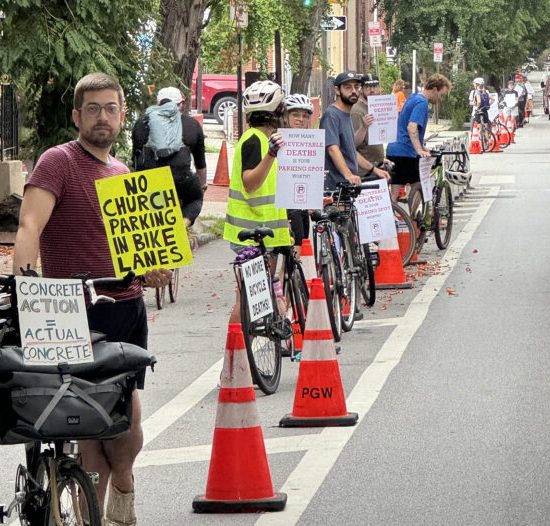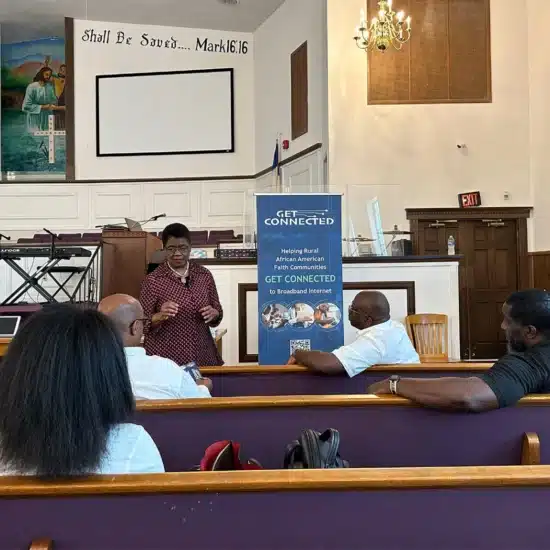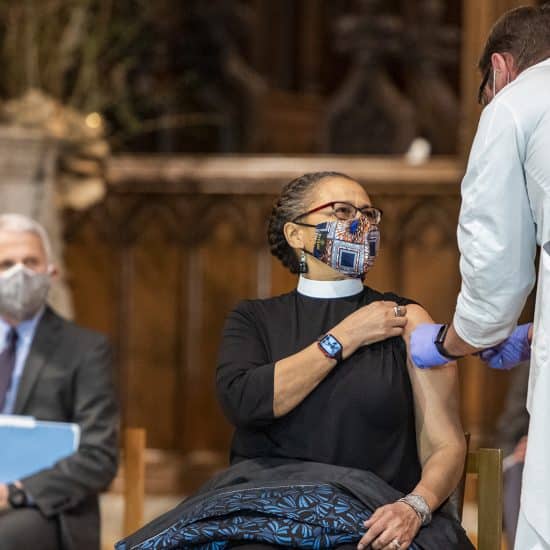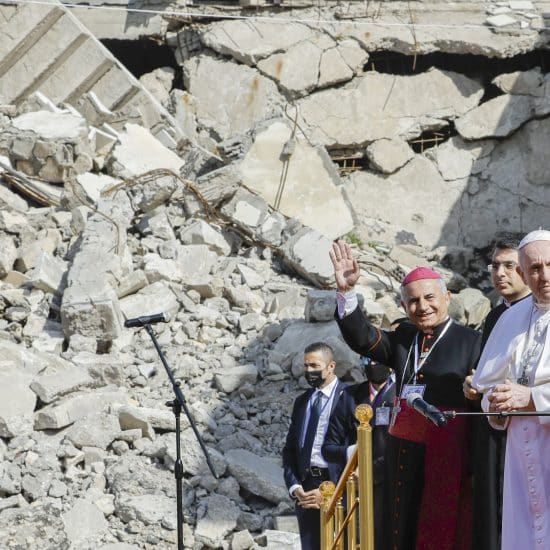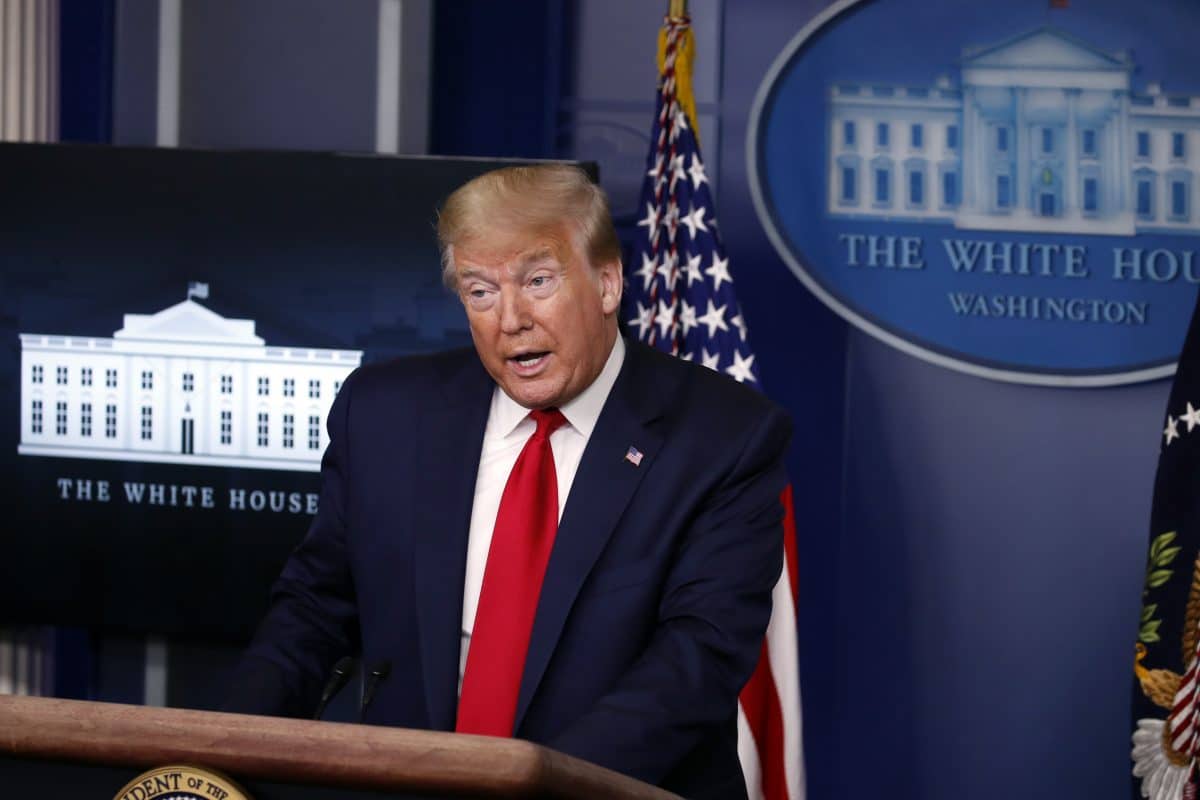
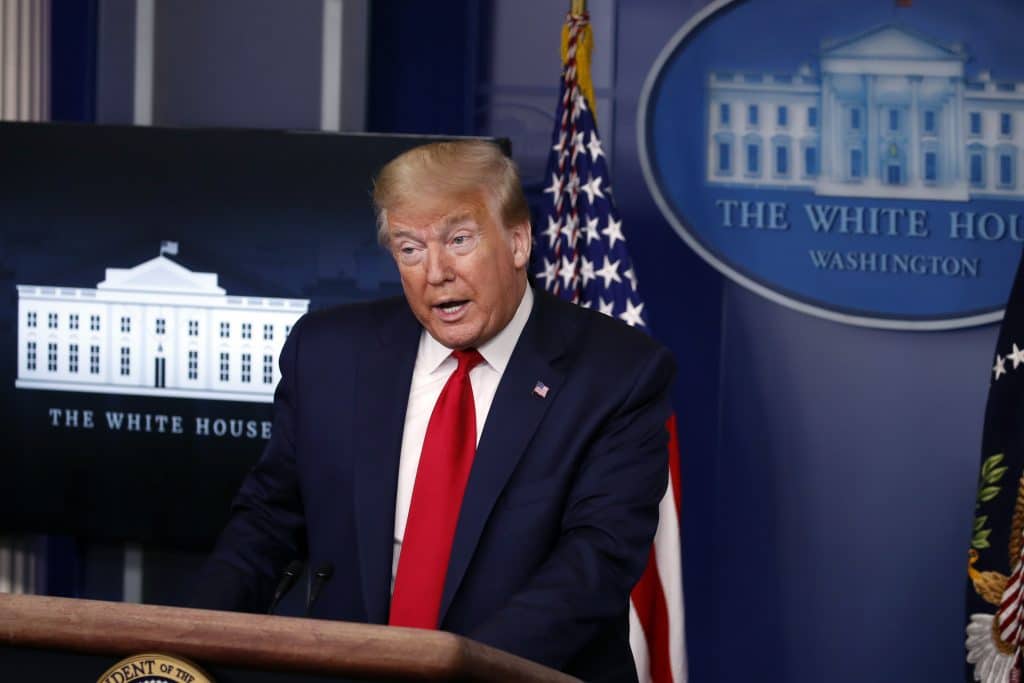
President Donald Trump speaks with reporters about the coronavirus in the James Brady Briefing Room of the White House, Friday, May 22, 2020, in Washington. (AP Photo/Alex Brandon)
NEW YORK (AP) — President Donald Trump said Friday (May 22) that he has deemed churches and other houses of worship “essential” and called on governors across the country to allow them to reopen this weekend, even as some parts of the nation remain under coronavirus lockdown. His declaration comes at a precarious point in the national balancing act that pits the call of worship against the risk of coronavirus.
Public health agencies have generally advised people to avoid gatherings of more than 10 people and encouraged Americans to remain 6 feet (1.8 meters) away from others when possible. Some parts of the country remain under some version of a lockdown, including Washington, D.C.
Trump stressed the importance of churches in many communities and took issue with other businesses and services that have been allowed to continue to operate.
“Some governors have deemed liquor stores and abortion clinics as essential” but not churches, he said. “It’s not right. So I’m correcting this injustice and calling houses of worship essential.”
“These are places that hold our society together and keep our people united,” he added.
Even before Trump’s comments Friday, which came alongside the release of guidance for reopening faith organizations from the Centers for Disease Control and Prevention, Christian leaders in several states made plans to welcome back congregants on the week of Pentecost, May 31.
The new CDC guidance could energize houses of worship that might want to reopen their doors, despite evidence of ongoing risk of the virus spreading through communal gatherings. While it suggests steps such as asking congregants to cover their faces and limiting the sharing of worship aids, the CDC document says it is “not meant to regulate or prescribe standards for interactions of faith communities.”
The guidance released Friday is similar to draft guidance drawn up by the CDC more than a month ago but shelved by administration officials. One difference: The earlier version discussed opening in stages, such as video streaming and drive-in services, with later phases allowing in-person gatherings limited in size and with social distancing. The guidance released Friday has no discussion of a phased-in opening.
Tension over when and how to reopen houses of worship has varied depending on the state, as different areas set their own pace for easing pandemic stay-at-home orders. Trump called for the resumption of in-person religious services repeatedly this week and said Friday that he would “override” governors that did not do so, though it’s unclear whether Trump has any authority to supersede state leaders on the issue.
Still, the president’s comments come less than six months ahead of a reelection bid in which turnout from his conservative evangelical Christian base could prove critical. Trump suggested on Thursday that friction over the issue was more common in states run by Democrats because “churches are not being treated with respect” by many their governors.
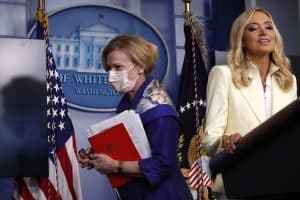
Dr. Deborah Birx, White House coronavirus response coordinator, leaves after speaking with reporters about the coronavirus in the James Brady Briefing Room of the White House, Friday, May 22, 2020, in Washington, as White House press secretary Kayleigh McEnany talks at the podium. (AP Photo/Alex Brandon)
One of those Democrats, California Gov. Gavin Newsom, was warned this week by Trump’s Justice Department that the state’s phased-in plan to restart economic activity puts an “unfair burden” on worship by not permitting churches to open earlier in the process. More than 1,200 California pastors are planning to restart worship on May 31 despite Newsom’s stay-at-home orders, which he has said would likely allow for religious gatherings within weeks.
Among the California pastors leading the call for resuming in-person gathering is Danny Carroll of Water of Life Community Church in Fontana. State officials “don’t understand that people of faith need contact, that they need to worship together,” Carroll said in an interview. “We’re trying to close the gap – thoughtfully, humbly, nicely.”
Carroll described his effort as disconnected from politics: “We don’t deal with how people vote. We deal with how people live.”
But another pastor involved, Ron Hill of Love and Unity Christian Fellowship, said that he finds “some merit” in Republicans’ claims that blue states have a less keen understanding of religion’s importance in public life.
“I really find it difficult to understand why they’re placing a different rule on the church than on the supermarket, café or restaurant,” said Hill, who added that he had not yet decided whether May 31 would mark the reopening of his church in Compton, Calif.
Pastors in other states, however, have already begun outlining plans to welcome back worshippers in person before the month’s end. Florida’s Rodney Howard-Browne – arrested in March for holding a large in-person service at his church, charges that were later dropped – is preparing to reopen with an outdoor service on Pentecost. Catholic and Lutheran churches in Minnesota have notified that state’s Democratic governor that they plan to resume Mass this week, in defiance of his order.
An evangelical pastor who’s been a key Trump backer, Jack Graham, plans to reopen his Texas megachurch on Pentecost weekend. Attendees of those services will be required to make reservations, but masks will not be mandated, according to the church’s website.
Graham told the Faithwire website this week that Pentecost, considered holy by Christians as the birthday of the church, was a fitting moment for “a kind of rebirth of the church” this year.
The momentum toward restarting in-person worship comes amid new reports of church gatherings spreading COVID-19. A CDC report released this week traced the spread of the virus to 35 out of 92 attendees at two March church events in Arkansas that were attended by two symptomatic people.
“Reopening faith communities, let alone reopening any other faith institutions, is unsafe” given the ongoing threat of spreading illness, said Maggie Siddiqi, director of the faith initiative at the liberal Center for American Progress. “My fear is we will learn the hard way and have to close again.”
While Pentecost promises to escalate the number of churches seeking to reopen, many other houses of worship are still expecting to wait until June or beyond to resume in-person services with restrictions aimed at protecting public health. Another prominent conservative evangelical ally of Trump, Pastor Robert Jeffress, said he is eyeing local metrics and could reopen next month.
Speaking before Trump’s Friday announcement, Jeffress said his Dallas-area megachurch would be “data-driven, instead of date-driven, when it comes to reopening.”
A spokeswoman for the ministry of Paula White-Cain, the pastor who leads Trump’s White House faith initiative, said earlier this week that at the moment Pentecost services at her Florida church were slated to be online-only.
Russell Moore, president of the Ethics & Religious Liberty Commission (ERLC), told Baptist Press: “Governments need to treat churches the same where there is sameness. Providing general guidance on practices and procedures to protect public health is welcomed by churches and businesses alike. Thankfully, this has been the case throughout much of the country.”
In written comments, Moore added that the ERLC and others “must also remind our civic leaders that churches are not the same as a local business in every way. The First Amendment guarantees a distinction. So, whereas guidance is welcomed, directives can quickly descend into threats.
“So when instances like Minnesota and California occur, it is particularly concerning and requires a response. These sorts of challenges to religious liberty must be resolved quickly and clearly.”
The president, has projected eagerness to restart religious services. Trump held a Thursday conference call with 1,600 “pastors and faith leaders” to tout the importance of reopening in-person worship, later saying that deeming liquor stores and abortion clinics essential but not worship was an “injustice.”
A person familiar with the White House’s thinking who spoke on condition of anonymity to discuss internal deliberations said Trump had called Friday’s news conference, which had not been on his public schedule, because he wanted to be the face of church reopenings, knowing how well it would play with his base.
Some governors designated faith gatherings as essential services in their states’ pandemic stay-at-home orders, although others restricted them as the virus began to spread.
Ralph Reed, chief of the Faith & Freedom Coalition and another conservative evangelical ally of Trump, said before Trump’s Friday announcement that while Pentecost is “an important marker for the church,” he doesn’t expect most Christian leaders would be “guided particularly by that date” in deciding to reopen.
But Reed lauded the growing push in that direction. “Churches are doing a good job” adapting to necessary public health constraints, he said, “but I do think it’s time for the country to reopen.”
Medical Writer Mike Stobbe contributed to this story, with additional reporting provided by Jill Colvin and Zeke Miller, Associated Press; Associated Press writers Jonathan Lemire in New York and Philip Marcelo in Boston; and Tom Strode, Washington bureau chief for Baptist Press.
Associated Press religion coverage receives support from the Lilly Endowment through the Religion News Foundation.

